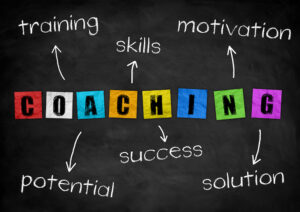In today’s fast-paced and dynamic business environment, individuals and organizations often seek external support and guidance to achieve their goals and overcome challenges. Two common approaches for providing this assistance are coaching and consulting. While both coaching and consulting involve working with clients to help them achieve specific objectives, they are distinct in their methodologies, processes, and goals. In this blog, we’ll explore “coaching vs. consulting” and help you determine which path might be the right fit for you or your organization.
Contents
What Does Coaching Mean?

Coaching is a personal and transformative approach to individual and professional development. Coaches focus on helping clients achieve their personal and professional goals by facilitating self-discovery, personal growth, and skill development. The primary objective of coaching is to empower clients to find their solutions, make decisions, and take actions that align with their values and aspirations.
Key Features of Coaching:
- Client-Centered: Coaches operate on the premise that clients are resourceful and capable of finding solutions themselves. The coach’s role is to guide, support, and challenge the client to uncover their potential.
- Goal-Oriented: Coaching is future-focused, with clear objectives and goals set by the client. Coaches assist clients in defining and achieving their desired outcomes.
- Non-Directive: Coaches avoid offering advice or solutions directly. Instead, they ask powerful questions, encourage reflection, and provide a safe space for clients to explore their thoughts and feelings.
- Holistic: Coaching often addresses personal development, work-life balance, and overall well-being. It acknowledges that personal and professional lives are intertwined.
- Long-term Relationship: Coaching relationships tend to be longer-term, helping clients make sustainable changes over time.
- Client Accountability: Clients are responsible for their actions and progress. Coaches hold them accountable for their commitments.
What Does Consulting Mean?
Consulting, on the other hand, involves providing expert advice, analysis, and solutions to specific problems or challenges. Consultants are typically subject matter experts who bring a depth of knowledge and experience to address specific issues faced by clients or organizations. The primary objective of consulting is to diagnose problems, offer recommendations, and, in many cases, implement solutions.
Key Features of Consulting:
- Expertise-Driven: Consultants are hired for their specialized knowledge and experience in a particular domain, industry, or problem area.
- Problem-Solving: Consultants assess current situations, identify challenges, and develop recommendations and solutions for clients to implement.
- Direct Advice: Unlike coaches, consultants provide specific guidance, strategies, and solutions to clients based on their expertise.
- Project-Oriented: Consulting engagements are often short-term and focused on addressing specific problems or initiatives.
- Results-focused: Consultants are usually measured by their ability to deliver tangible results, such as increased efficiency, cost savings, or revenue growth.
- External Perspective: Consultants offer an objective, external perspective on the client’s situation, which can be invaluable for solving complex problems.
Coaching vs. Consulting: Key Differences

To provide a clearer understanding of the differences between coaching and consulting, let’s delve deeper into key distinctions in several important aspects:
Role of the Practitioner
- Coaching: Coaches serve as facilitators and guides, helping clients explore their goals, values, and personal growth. They do not provide direct solutions but use questioning techniques to stimulate self-discovery and decision-making by the client.
- Consulting: Consultants are subject matter experts who provide specific advice, solutions, and recommendations based on their expertise. They offer expert guidance to address particular issues or challenges faced by clients or organizations.
Focus
- Coaching: Coaching is primarily focused on personal development, self-awareness, and holistic growth. It emphasizes the client’s potential, well-being, and balance between personal and professional life.
- Consulting: Consulting is problem-centric, concentrating on diagnosing and solving specific issues, often within a business context. It is results-oriented and aims to deliver concrete solutions to clients.
Goal Setting
- Coaching: Goals in coaching are usually set by the client. Coaches assist clients in defining their objectives, aspirations, and action plans. The client’s agenda and desired outcomes drive the coaching process.
- Consulting: In consulting, goals are often predefined by the client, typically related to addressing specific challenges, projects, or objectives. Consultants work to achieve these predetermined goals.
Approach to Problem-Solving
- Coaching: Coaches adopt a non-directive approach, refraining from providing solutions or advice. They use questioning and reflective techniques to guide clients in finding their answers and making decisions.
- Consulting: Consultants offer expert advice and direct solutions to clients. They leverage their knowledge and experience to analyze problems, develop strategies, and provide concrete recommendations for clients to implement.
Accountability
- Coaching: Clients are responsible for their actions and progress in coaching. Coaches hold clients accountable for the commitments and actions they’ve set for themselves.
- Consulting: Consultants may play an active role in implementing their recommendations, so there is a shared responsibility for the outcomes. Clients are responsible for executing the prescribed solutions.
Relationship Duration
- Coaching: Coaching relationships are often longer-term, extending over months or even years. This allows clients to work on personal growth and make sustainable changes over time.
- Consulting: Consulting engagements tend to be shorter in duration, and focused on specific projects or issues. They are typically completed within a defined timeframe.
Cost
- Coaching: Coaching is generally more cost-effective than consulting, making it accessible to a wider range of individuals and organizations. It’s especially popular for personal development and life coaching.
- Consulting: Consulting services can be more expensive, given the specialized expertise and solutions provided. This cost is often justified by the tangible results delivered.
Client Responsibility
- Coaching: Clients take an active role in their growth and development. They are responsible for setting their goals, making decisions, and driving their progress.
- Consulting: Clients often have a more passive role, especially when it comes to implementing consultant-provided solutions. They are primarily responsible for executing the recommended strategies.
Problem Complexity
- Coaching: Coaching is best suited for complex, multifaceted problems that involve personal growth, self-awareness, and behavioral changes.
- Consulting: Consulting is effective for well-defined problems that require specific expertise and solutions, often within the context of business and organizations.
Choosing the Right Path Between Coaching and Consulting

Deciding between coaching and consulting depends on your specific needs and goals. Here are some considerations to help you make an informed choice:
1. What are your objectives?
- If you’re looking to enhance your personal growth, leadership skills, or work-life balance, coaching might be the right choice.
- If you have a specific business problem or project that requires expert guidance, consulting is more suitable.
2. Do you need solutions or self-discovery?
- If you seek expert advice and solutions, consulting is the way to go.
- If you want to uncover your potential and develop self-awareness, coaching is the better option.
3. What’s the nature of your relationship with the provider?
- If you’re seeking a long-term, collaborative relationship, coaching is a better fit.
- If you need short-term, results-driven assistance, consulting is the answer.
4. Are you willing to take responsibility for your actions and growth?
- Coaching places a higher emphasis on personal accountability, so you should be prepared to actively engage in the process.
- Consulting often involves external experts driving change, so your responsibility may be more on implementing recommendations.
5. Is the problem well-defined or complex?
- For well-defined problems with clear solutions, consulting is effective.
- If the problem is complex, requires personal growth, or has multiple facets, coaching can be more beneficial.
6. Do you have a budget constraint?
- Consulting services may be more expensive due to the specialized expertise involved.
- Coaching can be more cost-effective and accessible for individuals or small organizations.
Ultimately, the choice between coaching and consulting depends on your unique circumstances, preferences, and objectives. It’s important to consider the nature of the challenge you’re facing and whether you require expert advice or personal growth and self-discovery. Many professionals and organizations even choose to blend elements of both coaching and consulting to create a customized approach that best meets their needs.
Conclusion
In the realm of personal and professional development, coaching and consulting serve as valuable tools for growth and problem-solving. Whether you’re seeking personal growth and self-discovery or specialized expertise and problem-solving, understanding the differences between these two approaches is key to making an informed choice that aligns with your unique goals and challenges.
If you looking for online coaching MantraCoach is here to help. Book your free trial online coaching session now to connect with a specialist coach.


